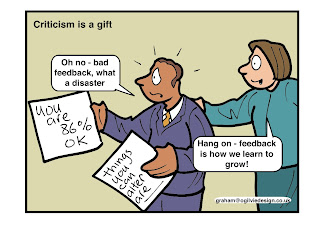What is Peer Editing? What method Will I Use?
Peer editing is working with a classmate (peer) to offer advise to help his/ her improve their work. It is important in the education process, for students as well as teachers. Being able to accept and give constructive criticism is an ever increasing necessary skill to have in today's world. However, it can also be very nerve racking for those who are not as familiar with the process as others. Personally, I like to offer my opinion or "second eye" if you will to my peers when I can, but tend to get a bit anxious when it comes to making corrections, etc. It is important to know what peer editing is for starters before trying to engage in the process. According to the video, What Is Peer Editing, it consists of three main aspects: Compliments, Suggestions, and Corrections. I plan to use the rubric created with my group as a helpful to in evaluating someone's writing. I plan to choose my method for offering my suggestions based off of the amount of errors in the writing I am reading. I prefer to do so through comments (C4C), but if a post has a numerous amount of grammatical errors, etc I will also communicate through email. This will make it more accessible for that person to communicate with me in case they have any questions.
What Have I Learned About Peer Editing?
After reading Paige Ellis's Blog, I have realized I do not need to stress so much about peer editing. She made some very valid points that if done correctly, it is a very useful and much appreciated tool to use. I have come to realize that offering constructive criticism does not need to be a difficult task to complete as long as I follow the three guidelines laid out in the What Is Peer Editing and the Peer Edit With Perfection tutorials. First, it is always important to make sure and point out the positive in someone's writing before making corrections or offering suggestions. This will prevent you from coming across as what was described as a "Picky Patty" or "Mean Margaret," in the video "Writing Peer Review Top 10 Mistakes." People enjoy hearing what they did well on and I believe it is important to give credit where credit is due. This video also made it clear to me just how important it is to give specific suggestions when offering advice. Just telling someone they need to add a comma is not much help, unless you tell them where in the writing the comma was needed. Making corrections is the last step in the process. When correcting a peer's writing, it is important to remember to use the symbols. Grammar, spelling, and punctuation mistakes are all things to look out for in the corrections portion of peer editing along with run-on sentences.
Peer editing does not have to be uncomfortable or a pain to do. It is like any other skill, the more you practice, the better you get at it. The C4C's we participate in, I believe are a valuable way for everyone to get comfortable critiquing others work. It also demonstrates that most of the time your peers want to hear your feedback. Most individuals will take it in as useful knowledge and feedback, which they will find very handy. As long as we take advice from the Peer Edit With Perfection Tutorial and offer suggestion and corrections in a positive way, I believe this is going to be a valuable skill for all students to have this semester.


Carla,
ReplyDeleteI thought you did a great job on talking about what peer editing is. I really liked that you said you would comment or email based on how many errors there were in someone's writing. I feel the same way. My suggestion would be to make sure you link your videos and photos. My corrections are as follows.
"I have came to realize that offering constructive..." I believe that should be come.
"unless you tell the, where in the writing..." That should be them
Those were the only errors I noticed. Just make sure you proofread a couple times before publishing it. I thought you did a great job on this assignment.
Caitlin Hinton
I appreciate the feed back! Thank you!
ReplyDelete"... to offer advise to help his/ her improve their work...." advice, not advise; him, not his
ReplyDelete"... is an ever increasing necessary skill to have..." Better to say this: is an increasingly necessary skill to have...
"...based off of the amount of errors..." based on would be better than based off of.
"... tell the, where in the writing the comma was needed." I think you left out student. The comma should be replaced by an appropriate noun.
"The C4C's we participate in, I believe are a valuable way for everyone to get comfortable critiquing others work." You need a comma after believe. others' not others